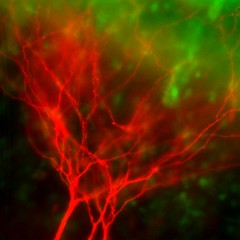My
neuroword contest has brought many clever, creative entries from people like an artificial intelligence developer, neuroethicist, neuroinformatics developer, and some just described as neuroscientists. But one member of that subset has a problem with the idea instead.
"Academia owes nothing to 'pop-science,'" says Sean in
a comment at Brain Waves in response to Zack Lynch blogging about the contest. "We should really appreciate what we have and preserve the integrity of the field of neuroscience."
I'm disappointed Sean won't be entering his word "neuroisms" but even more that he fails to see the value in them.
In my original post I mentioned a "grand" neuroword called
Neuromancer. It's writer William Gibson's neuroword, title of one of the most influential novels - not just sci fi novels - of all time. Many of today's Ph.D grads grew up dreaming of his cyberspace and neural interface concepts. The entire net is indebted to technology that developed from his creative visions and the words he coined to describe them (like "cyberspace") and science continues to experiment with future apps. Concepts like recording dreams, described in the story
The Winter Market from
Burning Chrome, inspire imagination and ultimately research. Aldous Huxley described virtual reality "feelies" in
Brave New World decades ago and technology still hasn't caught up to his vision, but we're certainly on our way. I blogged about one development yesterday. Huxley also influenced bioethics and psychopharmacology. Soma and moksha were prescient, and cloning impacts academia and pop culture alike.
The
H.G. Wells Award for Outstanding Contributions to Transhumanism for 2006 was awarded to
Charles Stross, a science fiction writer and scientist, for his insightful vision of the singularity in his novels. [Free ebook
here.] Artificial intelligence technology owes much to neuroscience and vice versa - and often where they overlap is in the arts.
A neuroword (or "neurologism: a word created by prefixing "neuro" to almost any normal word") can inspire thinkers in new directions, including of course scientists but anyone who reads them. And words are the writers' domain.
A few other contest entries describing innovative applications, sciences borne of neurowords:
"Neurovisual: visual input originating from internal neuroimplants rather than from the eye."
"Neuromanticism: the discipline that investigates neural correlates of love."
"Neurodigitization: the process of translating data and information about a nervous system into a sequence of discrete symbols from a finite set."
"Neuroceutical: A side-effect free neuropharmaceutical."
Limiting expression to nothing but the word neuroscience would be death instead of synergy. And what was that about academic science looking to pop science creativity?
***
Brain Awareness Week cascades on, and today's
neurosong is another kind of pop science, music made by a robot. From
Traditional Robot Music Vol. 2, this is
Neuron-Nest - March of the Bot Posse.
Contribute to science by entering your neuroword in the
contest. Thanks for all the neurotastic entries to date!





